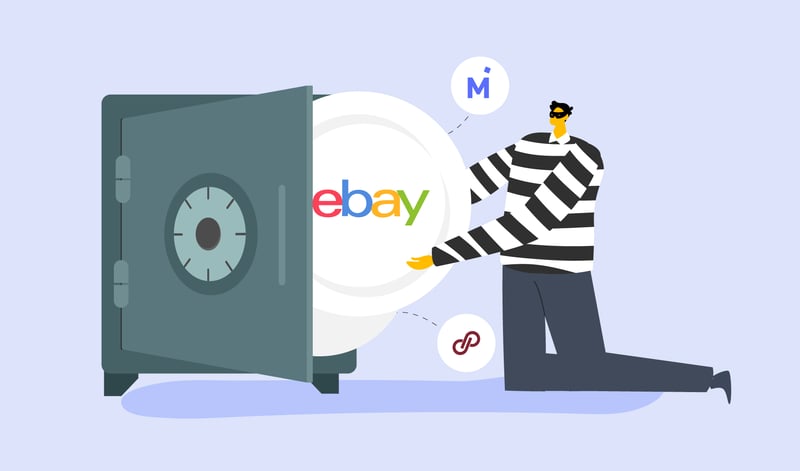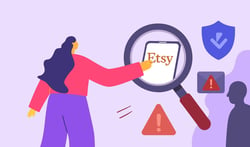Reselling has become one of the popular ways for individuals who want a side hustle, with the rise of online shopping platforms and the gig economy. However, a popular question always comes up: is reselling legal? This blog tries to walk that tightrope—looking at the nuances and ethical questions around reselling—giving a bird's eye view on what those wanting to go this route might anticipate.
Main Takeaways:
- Yes, reselling is legal but there are limitations.
- Big brands may target resellers and have their listings removed.
- The best way to protect yourself is to stay informed.
What is Reselling?
Reselling is when you buy an item (or own an item) and then sell them to someone else, usually for a profit.
Reselling is typically conducted by regular people, like you and me, who are casual sellers in Facebook Marketplace, eBay and other second-hand marketplaces.
If You're Thinking, Is Reselling Illegal?
There are a few reasons why some people might ask themselves "is reselling legal". Let's take a closer look:
How do brand restrictions affect reselling?
Some brands don’t like people reselling their items. Here’s why:
- Maintaining Image: Brands often want to control where and how their products are sold to maintain a certain image and pricing.
- Authorized Dealers Only: Many brands have agreements with authorized dealers and don’t want their products sold outside these channels. This can sometimes lead to confusion about the legality of reselling.
What are the concerns about counterfeit goods?
Counterfeit goods are fake items made to look like real products. Selling these is illegal for several reasons:
- Consumer Protection: Counterfeit items are often poor quality and can be dangerous, so laws protect consumers from these fake products.
- Accidental Selling: Sometimes, people worry they might accidentally sell counterfeit items without realizing it. This can happen if you don’t carefully verify the authenticity of what you’re reselling.
What Brands Should I Avoid Reselling?
Did you know that reselling platforms have strict policies against counterfeit goods and brand intellectual property violations?
Many eBay resellers have faced horror stories of store shutdowns—or worse, lawsuits from the brands.
Here are a few notable brands causing difficulties for resellers:
- Disney
- Nike
- Louis Vuitton
- Beach Body
- Abercrombie & Fitch
- Rosetta Stone
To protect yourself, a quick Google search of “brands not to sell on (insert marketplace name)” is definitely worth your time!
Here’s a more detailed list that eBay has provided!
Why are sales tax issues a concern in reselling?
Taxes can be tricky when it comes to reselling. Here’s what you need to know:
- Sales Tax Requirements: Depending on where you live, you might need to collect and pay sales tax on the items you sell. Not doing this correctly can get you into legal trouble.
- Income Reporting: Any profit you make from reselling needs to be reported as income. Failing to report this can lead to fines and other penalties from tax authorities.
Is it illegal to resell items you buy?
In most cases, no, it's completely legal to resell items you buy. Here's why:
Can you resell used items legally?
- First Sale Doctrine: In the U.S., this doctrine says that once you buy something, you can do whatever you want with it, including reselling it.
- Personal Property Rights: If you own it, you can sell it. This covers garage sales, thrift store finds, and personal items.

(image source: U.S. Department of Justice)
Restricted Items For Resellers
- Counterfeit Goods: Selling fake items is illegal. Always make sure what you're selling is authentic.
- Stolen Property: Selling stolen items is a big no-no. If it’s not yours legally, you can't sell it.
- Regulated Goods: Some items, like certain electronics or health products, might have extra rules.

How can you resell legally and safely?
Want to make sure you're on the right side of the law? Here are some tips:
3 steps to ensure reselling legally
- Keep Records: Track your purchases and sales. This helps if you need to prove where you got something.
- Verify Authenticity: Make sure the items you sell are genuine. Research brands and learn to spot fakes.
- Understand Tax Obligations: Depending on where you live, you might need to charge sales tax or report income from reselling.
Best Practices for Ethical Reselling
- Be Honest: Always be clear about the condition of the items you’re selling.
- Respect Trademarks: Don’t use brand logos or names in a way that suggests you’re officially associated with them if you’re not.
- Stay Informed: Laws can change, so keep up with any new regulations about reselling.
My best advice is to stay updated on which brands are on the prohibited list. Big-time resellers on YouTube and social media influencers often discuss this online.
Download our FREE Reseller's Checklist!







